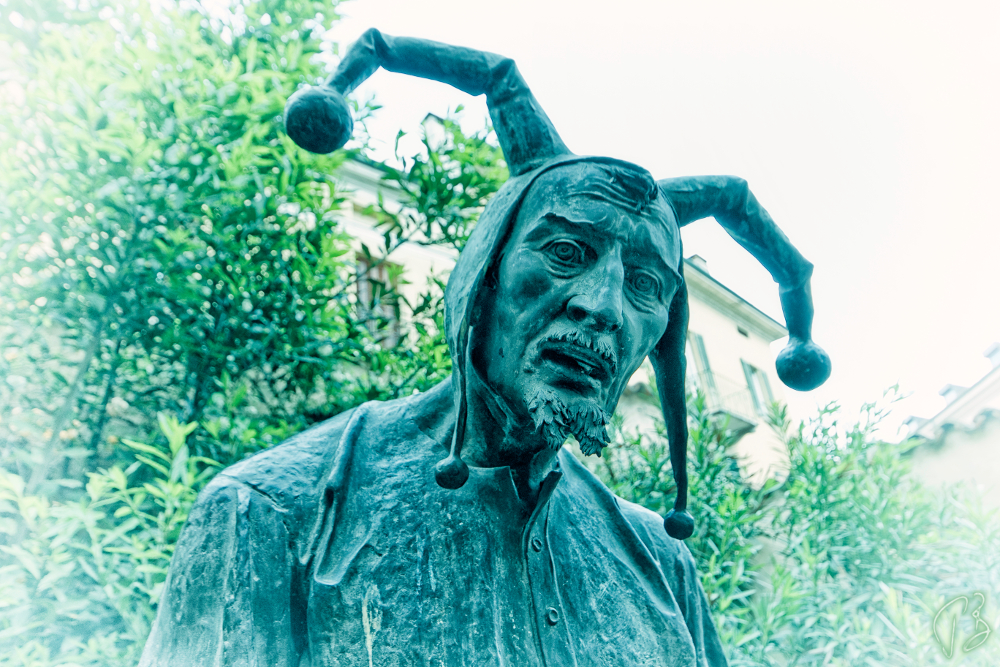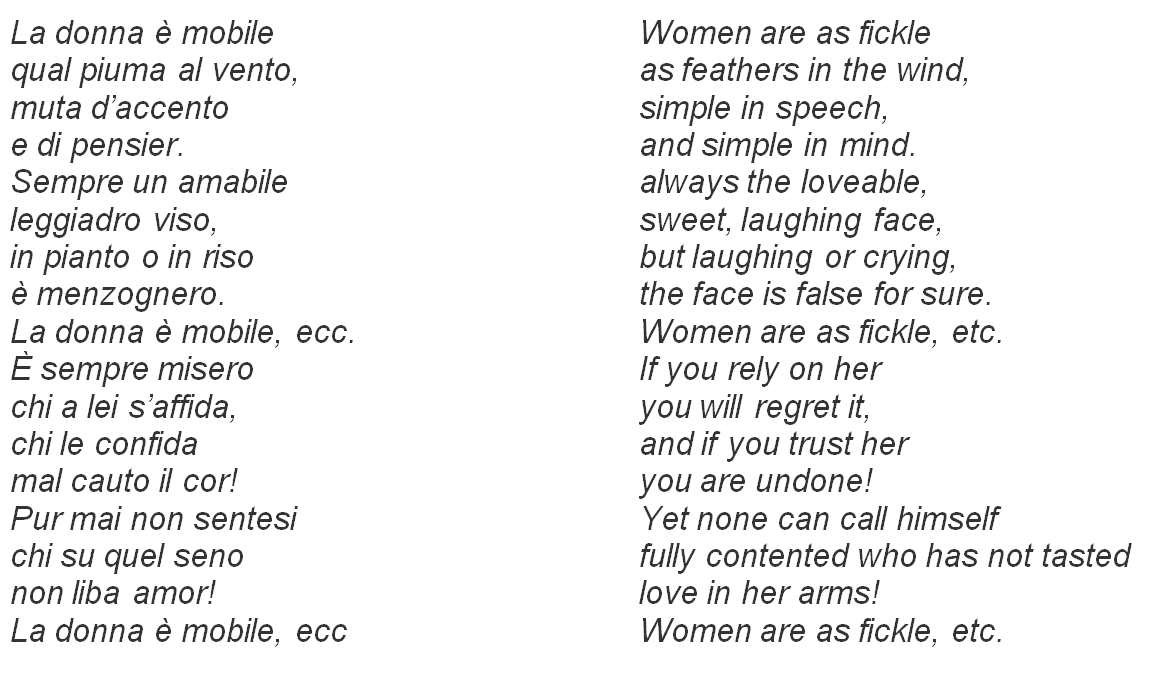Lost in Translation
Looking for meanings in words, images and sounds
Fortune is Fickle i.e. May in Mantua
Set in the 16th century Mantua, Rigoletto is an opera with a tragic story that revolves around the lascivious Duke of Mantua, his court jester Rigoletto and Rigoletto’s beautiful daughter Gilda. The opera’s original title, La maledizione (The Curse), refers to the curse put on both the Duke and Rigoletto by a courtier whose daughter had been seduced by the Duke with Rigoletto’s encouragement. The curse is fulfilled when Gilda also falls in love with the Duke and sacrifices her life to save him from the assassins hired by her father.
Modelled after Victor Hugo’s play Le roi s’amuse (The King Has Fun), Rigoletto is not only a social critique of the corrupt society, but also an account of a personal drama of an unscrupulous, boot-licking miser who plots against unsuspecting people to please his womanizing master. Rigoletto’s famous last words when he discovers the dead body of his daughter in place of the Duke’s: Mia Gilda! E morta. Ah, la maledizione! echo the last cry of Hugo’s jester Triboulet: J’ai tue mon enfant. (I killed my child).
It is not a coincidence that I chose Rigoletto’s statue to feature May.
Early this month I took a trip to Mantua. In a small yard in the shadow of Saint George’s Castle stands a statue of Rigoletto, a hunchbacked court jester and the tragic figure of Verdi’s most performed opera.
At last the moment of vengeance is at hand!
For thirty days I have waited,
weeping tears of blood
behind my fool’s mask.
Act 3 opens with the famous aria La donna è mobile sung by the character playing the Duke, disguised as a soldier. It is an irony. The Duke sings that all women are fickle and that they will betray anyone who falls in love with them, but no character in this opera is rational or reliable. They may all be considered callous or mobile (inconstant).
Here is the libretto (the original and English translation), and if you click on the player button bellow, you’ll hear Pavarotti sing it:
On the same trip, during my visit to a petting zoo, I witnessed a horrible and a most absurd accident in which a small baby, bundled in his father’s arms, was attacked by a donkey.
Ah, la maledizione!
Some say that women are fickle. It may be so, but so is the fortune.
This is my entry for Cardinal Guzman’s monthly photo challenge Changing Seasons.


Pingback: The Changing Seasons: May 2016 – Cardinal Guzman
“At last the moment of vengeance is at hand!”
Yes!! 😀 I’m glad I don’t have to wear a hat like that. Thanks for the entry Paula. I’m at work, so I’ll read through it later.
LikeLiked by 1 person
Such a sad story, a sad statue- and so true your last line. I enjoyed listening to Pavarotti Paula.
LikeLike
Thank you, DM. I only just realised how many people fail to read the whole text. Thank you for not being superficial on my blog.
LikeLike
I learn so much from reading blogs- stories I never knew, places I have never seen. Thank you for sharing Paula
LikeLike
A sad statue but so apt for the story, and your title.
LikeLike
Thank you, Draco.
LikeLike
Very interesting, very well done… 🙂
LikeLike
Thanks for reading me. Have a good week, Drake!
LikeLiked by 1 person
Really enjoyed your entry on Mantua , Paula , and the popular aria ‘s lyrics in English ….
People my age , in Italy , surely recognize the Italian ones , since our grandfathers used to sing opera’s arias cuddling their grandsons….!
LikeLike
This is not a happy post.
LikeLike
No need to read me.
LikeLike
Interesting story. I’ve never seen this opera, so thanks for sharing. 🙂
LikeLike
Pleasure to share, Catbird.
LikeLiked by 1 person
Love Pavarotti! What a tragic opera. I didn’t know the story. And the scene you witnessed at the zoo sounds horrible. So sorry.
LikeLike
Thank you for reading Linda. When people first hear the aria, they do not imagine that it is part of a tragic story. I still have nightmares from seeing what I saw. It ruined my short holiday.
LikeLike
I’m so sorry, Paula. Holidays seem so few and far between and I’m especially sorry yours was spoiled. 😦
LikeLike
Oh my goodness the incident at the petting zoo sounds awful Paula. As a New Grandmother it actually made my stomach turn. Hopefully the baby did not suffer lasting injuries.
LikeLike
There is no way that I can learn how badly the baby was injured cause I don’t know the people, but I still dream about it. It was his father’s fault entirely, but it does not diminish the gravity of this absurd situation. A 4 month old baby has no business being introduced to a donkey.
LikeLiked by 1 person
I hope the images fade from your dreams Paula. When I have witnessed or assisted with accidents I find the not knowing the outcome very difficult. Sending hugs across the miles.
LikeLike
Yes, that’s it, cause I keep imagining smashed little fingers, amputated etc. and it torments me. I was hesitant about writing about it in this post, but the absurd death of Rigoletto’s daughter and this absurd accident provoked by a father was too much of a coincidence and also I selfishly thought that writing about it will make my nightmares stop. Thank you for reading, Sue.
LikeLiked by 1 person
I do hope it helps Paula. I know i find sharing such a situation with others cathartic. xo
LikeLike
Thank you again Sue for lending your ear and your helpful hand.
LikeLiked by 1 person
Really interesting Paula and great music too!
LikeLike
Thank you, Gilly.
LikeLike
The number of times I’ve heard this piece of music and done no more than enjoy Pavarotti! 🙂 Thank you for the explanation.
LikeLike
Beautifully written text with a lot of interesting information. A very enjoyable read!
LikeLike